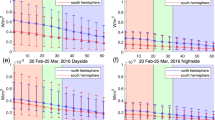Abstract
IN recent months average values have been available to us of outgoing long-wave radiation recorded by Tiros IV for the equatorial region between 50° E. to 110° E. and 20° N. to 20° S. These observations were obtained through the courtesy of Mr. P. Krishna Rao, of the U.S. Weather Bureau. They represent averages for 5-day periods in the pre-monsoon months of April, May and June 1962, and are shown in Fig. 1 in langleys/min.
This is a preview of subscription content, access via your institution
Access options
Subscribe to this journal
Receive 51 print issues and online access
$199.00 per year
only $3.90 per issue
Buy this article
- Purchase on Springer Link
- Instant access to full article PDF
Prices may be subject to local taxes which are calculated during checkout
Similar content being viewed by others
References
Das, P. K., Tellus, 14, 2, 212 (1962).
Bryson, R. A., Dept. Meteorol.,Univ. Wisconsin (personal communication).
Author information
Authors and Affiliations
Rights and permissions
About this article
Cite this article
GUPTA, M. Outgoing Long-wave Radiation from Indian Stations. Nature 207, 852–853 (1965). https://doi.org/10.1038/207852a0
Issue Date:
DOI: https://doi.org/10.1038/207852a0
Comments
By submitting a comment you agree to abide by our Terms and Community Guidelines. If you find something abusive or that does not comply with our terms or guidelines please flag it as inappropriate.



